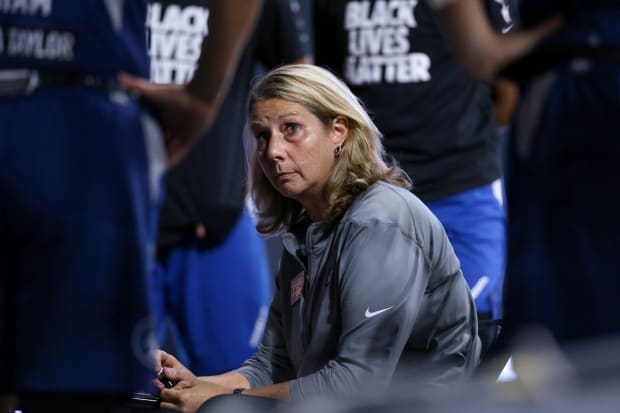The GM and coach writes that there is no room in women’s sports for divisiveness and discrimination.

As the general manager and head coach of the Minnesota Lynx, I spend a lot of time thinking about what makes a winning team. It takes more than just signing individual athletes, no matter how talented they are or how hard they work. I look for players who are confident enough in themselves to know when the moment calls for them to lead, and also when it’s time to let their teammates shine. Because athletes are leaders on and off the court, I always encourage my team to engage with the issues that affect the world around us. I am proud when my team shows up for Black lives, fights against pay disparities in women’s sports and celebrates our LGBTQ fans. And today, I am proud to speak up in support of the right of transgender women and nonbinary athletes to compete in women’s sports.
When we welcome all woman athletes, including transgender woman athletes, to bring their full authentic selves to the game, we are stronger as individual players and as a team. I have dedicated my life to women’s basketball long enough to know that the true threats to women’s sports lie in obstacles like severe pay disparities, lack of investment in women coaches and an overall lack of resources dedicated to women’s sports from scholastic competition through to the elite level. Transgender exclusion pits woman athletes against one another, reinforces the harmful notion that there is only one right way to be a woman and distracts us from the real threats to women’s sports.
I am proud that my team’s home state, Minnesota, protects transgender athletes from discrimination. In fact, Minnesota was the first in the nation to protect transgender, gender-nonconforming and nonbinary people in a state human rights act. And the Minnesota State High School League—like the Internal Olympic Committee, NCAA and other professional sports leagues—has an inclusive policy that allows athletes to play on the team consistent with their gender identity. Nevertheless, far too many transgender athletes still face discriminatory hurdles constructed by those who want to unjustly ban them from women’s sports.
JayCee Cooper, a powerlifter in our home state of Minnesota, is suing USA Powerlifting, with the help of Gender Justice and Nichols Kaster, over USAPL’s discriminatory ban that prevents transgender women from participating in the sport. In addition to violating Minnesota state law, this ban also goes directly against Principle 6 of the Olympic Charter, which states that any form of discrimination has no place in Olympic sports. This ban simply cannot stand, and we are confident that it will not stand.
I’m closely following this case and am proud of JayCee for leading the fight to ensure our teams and leagues live up to the values inherent in sports—respect, dignity, perseverance, equality, and inclusion. JayCee is an exceptional athlete who walks the walk when it comes to upholding our shared values—and she isn’t afraid to fight to be able to play the sport she loves and bring that opportunity to others.
There is no room in women’s sports for divisiveness and discrimination. Equity and basic fairness are not “zero sum.” Everyone wins when we extend athletic opportunities to more women and when we treat one another fairly. I’ve seen firsthand the power of inclusion to make sports better, and we all win as a global sports community when access is expanded, not diminished. I hope you will join me in supporting athletes like JayCee, and in standing up for the right of all women athletes to be our true authentic selves on and off the court.




Post a Comment
Thanks For Comment We Will Get You Back Soon.
EmoticonClick to see the code!
To insert emoticon you must added at least one space before the code.